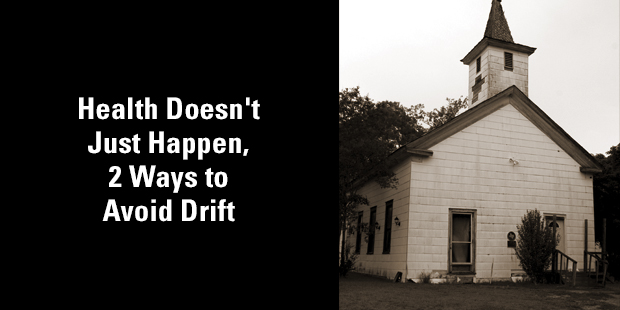
Learning to Live a Healthy, Biblical Lifestyle
Who takes care of the caregiver?
In your role of a leader and servant to your church, you probably push yourself to a point of exhaustion and beyond, rationalizing that you don’t have time for diets or exercise or that you will catch up on sleep later.
The reality is that the more you neglect your personal health, the less effective you actually are at caring for the spiritual health of others. Nodding off during meetings, eating greasy fast food while you drive, and collapsing on the couch during family time after work can be as destructive and sinful to your ministry as a moral failure.
Many leaders struggle with caring for their own health and well-being, and have become defeated and frustrated through the years as quick-fixes and January resolutions have come and gone. It is easier, and way more fun, to give in and neglect your own health.
Solution – Learn to live a healthy, biblical lifestyle
THE QUICK SUMMARY – The Daniel Plan, by Rick Warren, Daniel Amen, and Mark Hyman
During an afternoon of baptizing over 800 people, Pastor Rick Warren realized it was time for change. He told his congregation he needed to lose weight and asked if anyone wanted to join him. He thought maybe 200 people would sign up, instead he witnessed a movement unfold as 15,000 people lost over 260,000 pounds in the first year. With assistance from medical and fitness experts, Pastor Rick and thousands of people began a journey to transform their lives.
Here s the secret sauce: The Daniel Plan is designed to be done in a supportive community relying on God’s instruction for living. When it comes to getting healthy, two are always better than one. Our research has revealed that people getting healthy together lose twice as much weight as those who do it alone. God never meant for you to go through life alone and that includes the journey to health. The Daniel Plan shows you how the powerful combination of faith, fitness, food, focus, and friends will change your health forever, transforming you in the most head-turning way imaginably-from the inside out.
A SIMPLE SOLUTION
Making big and lasting changes in our lives is never easy – especially when it comes to something as personal as health, fitness, and lifestyle issues. In this area, especially around the first of the year, we are excited and firm in our resolve to begin the new year with healthier habits, including diet, exercise, and lifestyle. But oftentimes, those resolutions are forgotten as life continues – often at a faster pace.
The key to long-lasting success in any endeavor – including becoming healthier – is all about developing habits (see this SUMS Remix for help) (link to Remix 16). New, positive habits can replace old, self-defeating behaviors.
Of course, the problem is that old habits are difficult to change! Here are three reasons why it is so hard to develop new habits:
- Most have lived with our unhealthy habits for years and we are comfortable with them.
- Most of us are so comfortable with bad habits we identify with them.
- Most unhealthy habits seem rewarding to us – and what gets rewarded gets recognized.
It’s no wonder we have difficulty breaking bad habits and developing new, good ones!
What’s needed is a simple, straightforward way to assess your current health, make wise decisions in several key areas of your life, and gather a few friends who will take the journey with you.
Maybe it’s time to consider The Daniel Plan.
The Essentials are a pathway to much more than improved physical health. Each of the Essentials holds up your life, enlivens your body, enriches your mind, and fills your heart.
The Daniel Plan is based on five Essentials: faith, food, fitness, focus, and friends.
Faith – God’s power is the key to any transformational change in our lives, including our health. He wants us to plug into that power so that we can live and move the way He intended.
Food – You will be invited to eat natural foods that bring vitality and energy to your body and mind. As you slowly introduce real whole fresh food, your body will respond automatically and heal, and chronic symptoms will fade into memory. The Daniel Plan introduces you to a whole new world of fresh fruits and vegetables, beans, whole grains, nuts, seeds, eggs, chicken, fish, lean animal products, and spices.
Fitness – Leading health and wellness organizations such as the American College of Sports Medicine have discovered that moving your body even just a little bit on a regular basis impacts not only your physical health, but also your intellectual, emotional, social, financial, and spiritual health.
Focus – When your brain works right, you work right. When your brain is healthy, your ability to focus increases and you make better decisions. So many distractions compete for your attention, so it is important for you to renew your mind and focus on God’s plan and priorities for your life.
Friends – When it comes to your health, every body needs a buddy. Consider what your journey toward whole health would be like if you did it in community. Research shows that people getting healthy together lose twice as much weight as those who do it alone. That success dramatically increases when you are connected with others, receiving constant encouragement to stay focused and motivated toward your goals.
Rick Warren, The Daniel Plan
A NEXT STEP
No matter what shape you are, what age you are, or where you want to go, everyone has the same starting point: where you are right now. Your “right now” is going to be very different from others so you need to make this journey to better health your journey.
Here are a couple of questions to get you started:
- How is your overall health?
- What changes do you want to start with?
Using The Daniel Plan website (see link below), download the Essentials Survey.
Work through the survey, completing the questions on each of the five Essentials described above. Use the results as a benchmark as you begin the intentional journey to better health and well-being.
Rather than jumping into all five Essentials at once, use the results of the Essentials Survey to begin with one or two Essentials. As you work in those areas and improve, add one additional Essential at a time.
As a leader in the local church, the temptation may be to walk this journey toward health in isolation from your church body. The rationale comes from the “never let them see you struggle” lies that we believe make us a better leader. Find 2-3 trusted lay leaders and invite them to walk the Daniel Plan with you. If you are in a Small Group – and why wouldn’t you be? – consider walking through this study with your group. Your example and willingness to be publicly open with improvement in health will likely be a catalyst for growth in others of your congregation.
If you choose to follow The Daniel Plan as an intentional journey, take the Essentials Survey several months after beginning, and again at the end to help measure your progress.
Taken from SUMS Remix 27-1, published November 2016
This is part of a weekly series posting content from one of the most innovative content sources in the church world: SUMS Remix Book Summaries for church leaders. SUMS Remix takes a practical problem in the church and looks at it with three solutions; and each solution is taken from a different book. As a church leader you get to scan relevant books based on practical tools and solutions to real ministry problems, not just by the cover of the book. Each post will have the edition number which shows the year and what number it is in the overall sequence. (SUMS provides 26 issues per year, delivered every other week to your inbox).

Tags: Daniel Plan, Health, Rick Warren, SUMS Remix, healthy lifestyle















